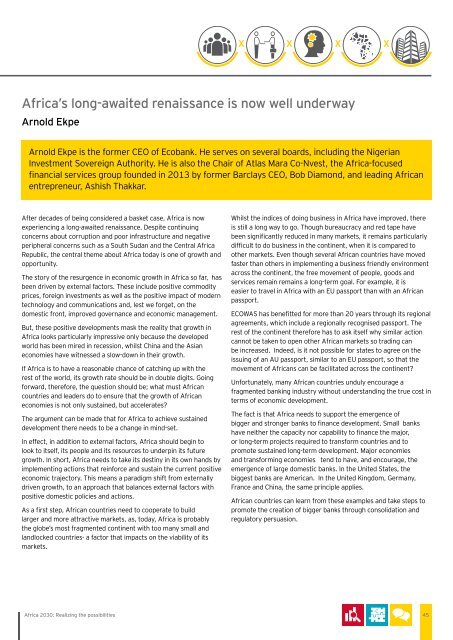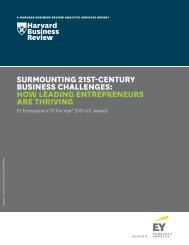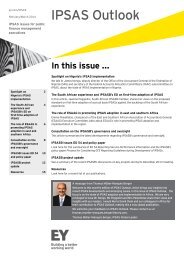Create successful ePaper yourself
Turn your PDF publications into a flip-book with our unique Google optimized e-Paper software.
Africa’s long-awaited renaissance is now well underwayArnold EkpeArnold Ekpe is the former CEO of Ecobank. He serves on several boards, including the NigerianInvestment Sovereign Authority. He is also the Chair of Atlas Mara Co-Nvest, the Africa-focusedfinancial services group founded in 2013 by former Barclays CEO, Bob Diamond, and leading Africanentrepreneur, Ashish Thakkar.After decades of being considered a basket case, Africa is nowexperiencing a long-awaited renaissance. Despite continuingconcerns about corruption and poor infrastructure and negativeperipheral concerns such as a South Sudan and the Central AfricaRepublic, the central theme about Africa today is one of growth andopportunity.The story of the resurgence in economic growth in Africa so far, hasbeen driven by external factors. These include positive commodityprices, foreign investments as well as the positive impact of moderntechnology and communications and, lest we forget, on thedomestic front, improved governance and economic management.But, these positive developments mask the reality that growth inAfrica looks particularly impressive only because the developedworld has been mired in recession, whilst China and the Asianeconomies have witnessed a slow-down in their growth.If Africa is to have a reasonable chance of catching up with therest of the world, its growth rate should be in double digits. Goingforward, therefore, the question should be; what must Africancountries and leaders do to ensure that the growth of Africaneconomies is not only sustained, but accelerates?The argument can be made that for Africa to achieve sustaineddevelopment there needs to be a change in mind-set.In effect, in addition to external factors, Africa should begin tolook to itself, its people and its resources to underpin its futuregrowth. In short, Africa needs to take its destiny in its own hands byimplementing actions that reinforce and sustain the current positiveeconomic trajectory. This means a paradigm shift from externallydriven growth, to an approach that balances external factors withpositive domestic policies and actions.As a first step, African countries need to cooperate to buildlarger and more attractive markets, as, today, Africa is probablythe globe’s most fragmented continent with too many small andlandlocked countries- a factor that impacts on the viability of itsmarkets.Whilst the indices of doing business in Africa have improved, thereis still a long way to go. Though bureaucracy and red tape havebeen significantly reduced in many markets, it remains particularlydifficult to do business in the continent, when it is compared toother markets. Even though several African countries have movedfaster than others in implementing a business friendly environmentacross the continent, the free movement of people, goods andservices remain remains a long-term goal. For example, it iseasier to travel in Africa with an EU passport than with an Africanpassport.ECOWAS has benefitted for more than 20 years through its regionalagreements, which include a regionally recognised passport. Therest of the continent therefore has to ask itself why similar actioncannot be taken to open other African markets so trading canbe increased. Indeed, is it not possible for states to agree on theissuing of an AU passport, similar to an EU passport, so that themovement of Africans can be facilitated across the continent?Unfortunately, many African countries unduly encourage afragmented banking industry without understanding the true cost interms of economic development.The fact is that Africa needs to support the emergence ofbigger and stronger banks to finance development. Small bankshave neither the capacity nor capability to finance the major,or long-term projects required to transform countries and topromote sustained long-term development. Major economiesand transforming economies tend to have, and encourage, theemergence of large domestic banks. In the United States, thebiggest banks are American. In the United Kingdom, Germany,France and China, the same principle applies.African countries can learn from these examples and take steps topromote the creation of bigger banks through consolidation andregulatory persuasion.Africa 2030: Realizing the possibilities45





